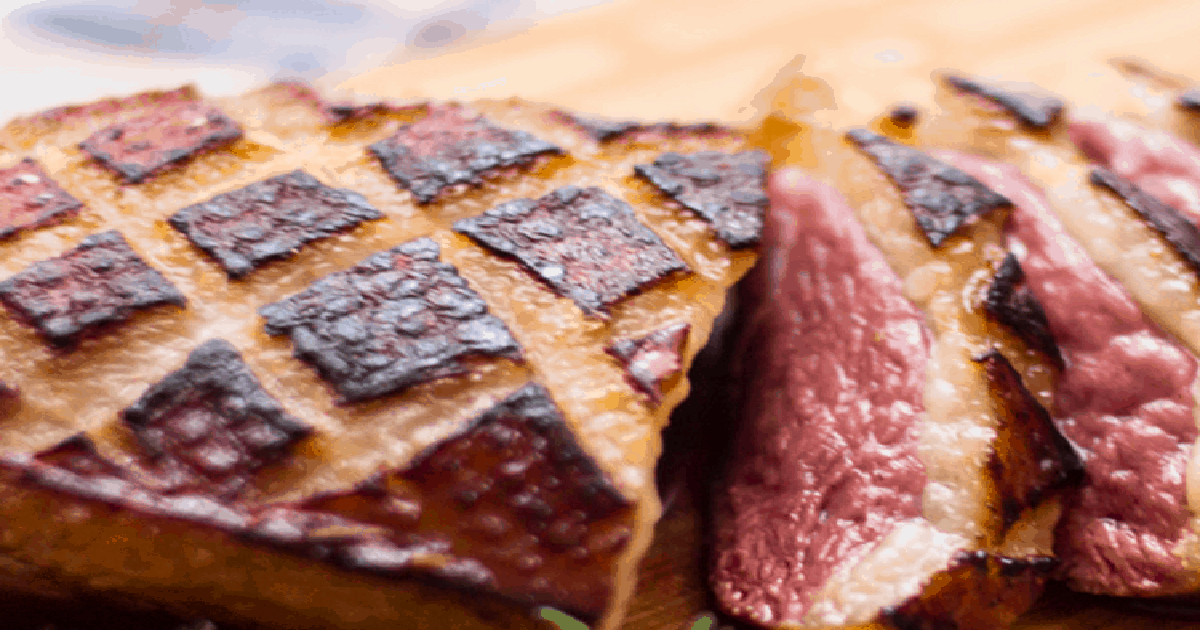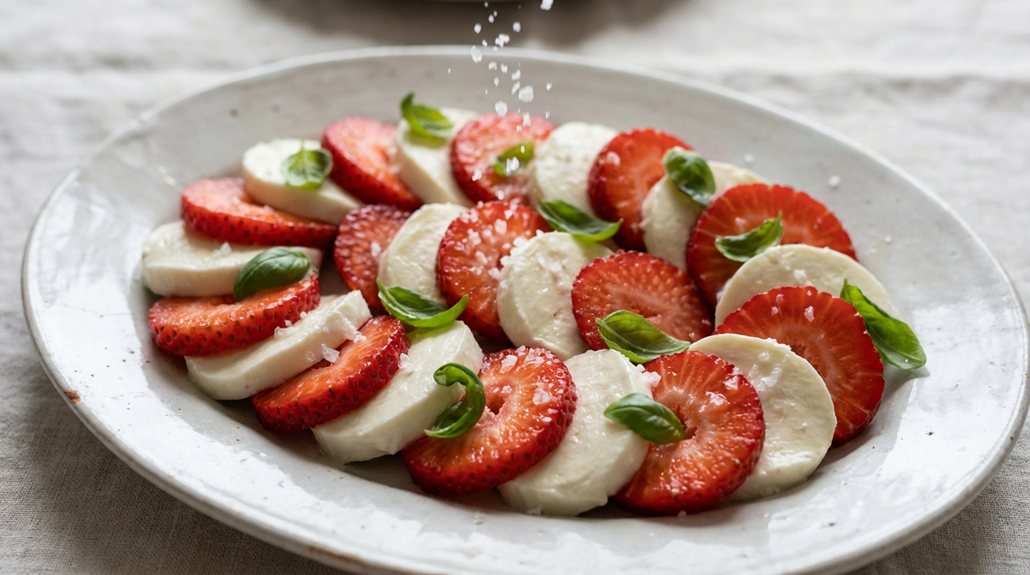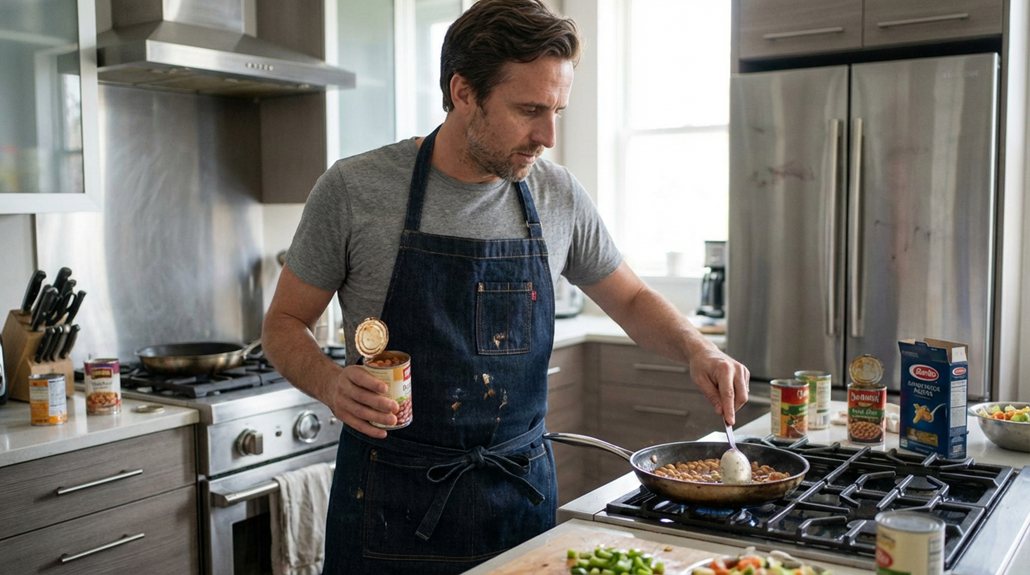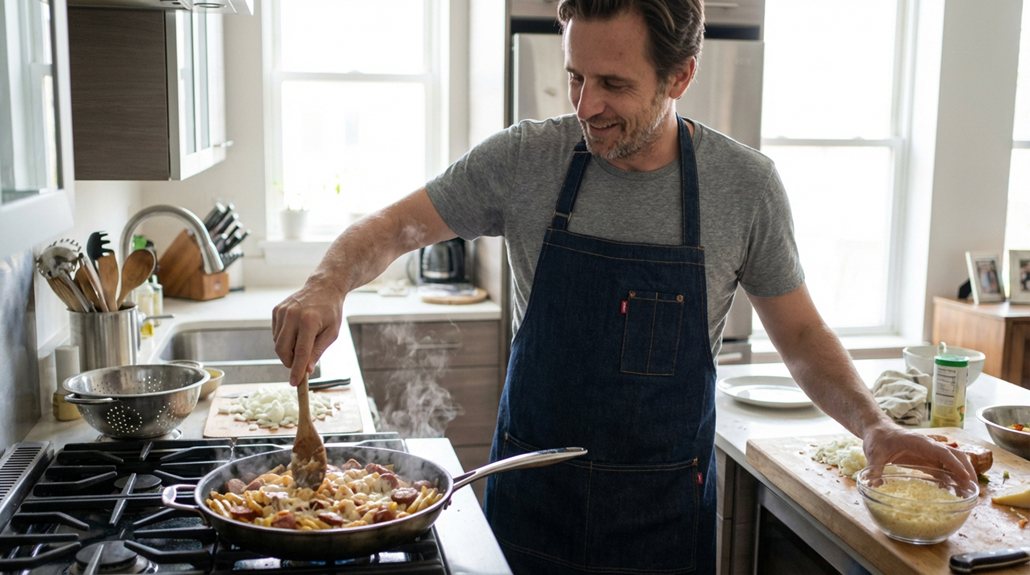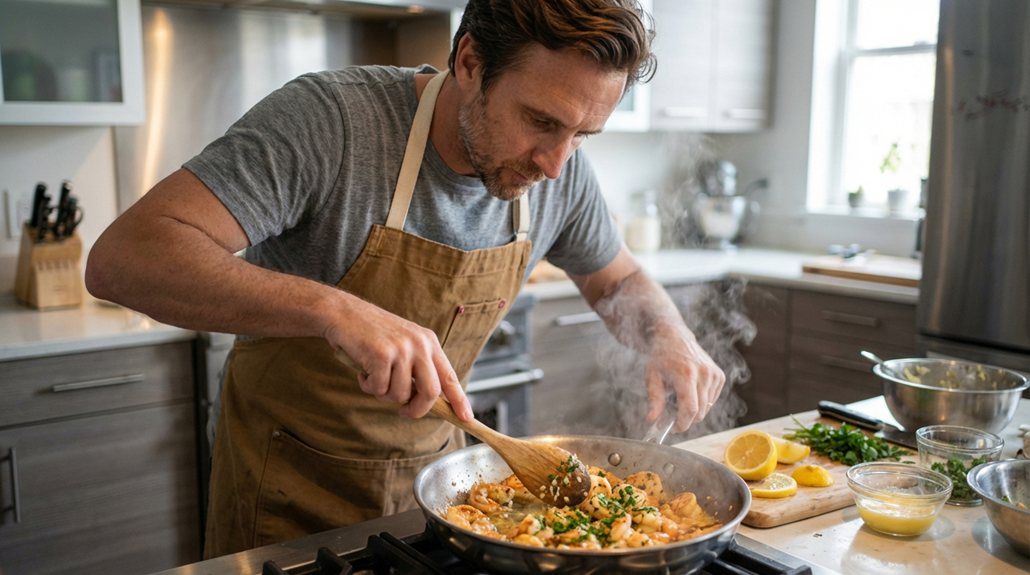A plate of perfectly pan-seared scallops, with their deep golden crusts and sweet, tender centers, feels like a special occasion. It’s the kind of elegant dish you’d expect at a high-end restaurant, but it’s surprisingly simple to make at home. This guide isn’t about a dozen complicated ingredients; it’s about mastering the right technique. Forget watery, rubbery seafood—this guide will show you how to nail this impressive dish every single time.
The Key Ingredients & Equipment
You only need a handful of high-quality ingredients to make exceptional pan-seared scallops. The quality of what you start with makes all the difference.
Choosing the Best Scallops: Dry-Packed vs. Wet-Packed
The single most important choice you’ll make is buying “dry-packed” scallops. Wet-packed scallops are treated with a phosphate solution that makes them absorb water. This extra moisture makes it nearly impossible to get a good sear. Look for dry-packed scallops at your fish counter. They should appear firm, slightly translucent, and have a sweet, fresh scent, not a fishy one. They won’t be sitting in a milky white liquid, which is the tell-tale sign of a wet-packed product.
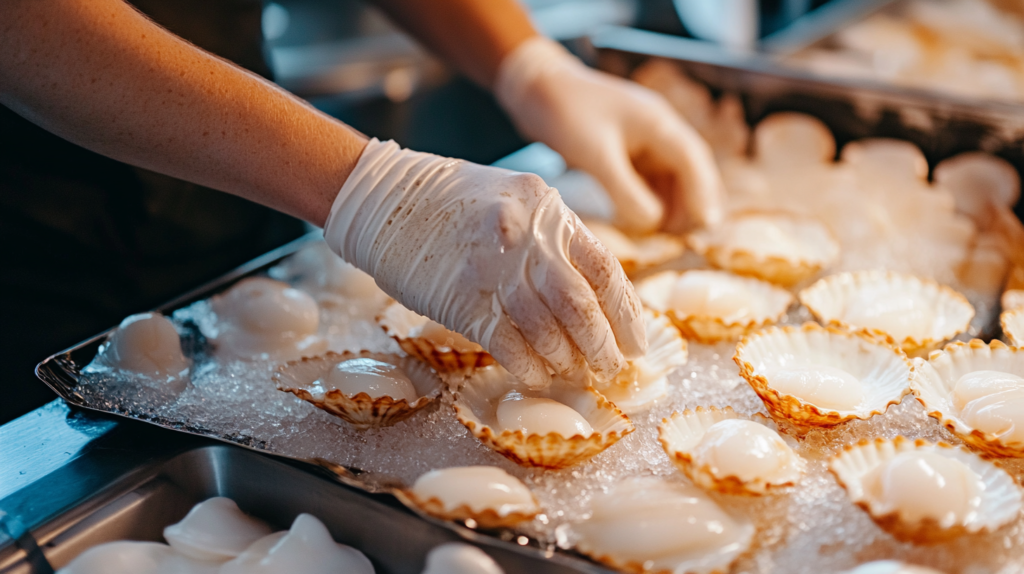
Simple Flavor Enhancers
- High-Smoke-Point Oil: You need an oil that can handle high heat without burning. Avocado, grapeseed, or canola oil are great choices.
- Unsalted Butter: Added near the end to enhance flavor, richness, and create a simple pan sauce.
- Garlic: A couple of minced cloves add a huge aromatic punch.
- Lemon: A final squeeze of fresh lemon juice brightens everything up.
- Salt & Pepper: For seasoning the scallops before they are added to the pan.
- Fresh Parsley (Optional): For a bit of color and fresh flavor at the end.
The Right Pan for the Job
To get a ripping-hot surface, a cast-iron or heavy-bottomed stainless steel skillet is your best friend. These pans retain heat exceptionally well, ensuring the temperature doesn’t drop when you add the scallops, which is crucial for building that crust.
Mastering the Technique: A Step-by-Step Guide
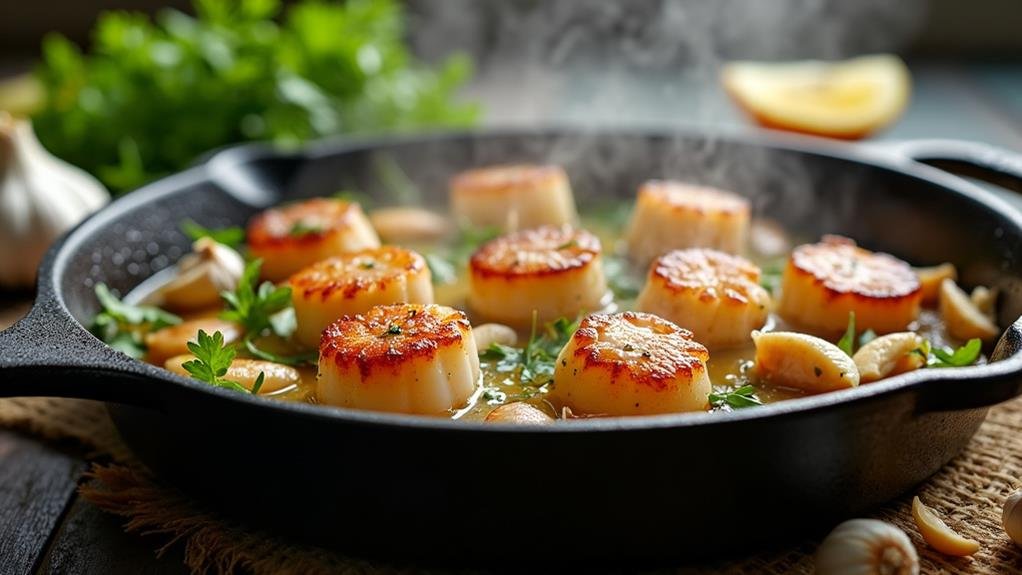
This is where the magic happens. First, prepare the scallops by removing the small, tough side-muscle if it’s still attached. Then, the most critical step: place them on a paper towel and pat them completely dry. Moisture is the number one enemy of a good crust because it creates steam. Season one side generously with salt and pepper.
Next, heat your skillet to a screaming hot temperature over high heat. Add a tablespoon of high-smoke-point oil. When it shimmers, carefully place the scallops in the pan, seasoned-side down. Be sure not to crowd them; they need space to sear, not steam. Now, leave them alone. Do not touch or move them for a full 1-2 minutes. This uninterrupted contact with the hot pan is what creates the Maillard reaction, resulting in that beautiful golden-brown crust.
Once you see a deep crust on the bottom, season the top side and flip the scallops. Immediately add a couple of tablespoons of butter and some minced garlic to the pan. As the butter melts and foams, tilt the pan and use a spoon to baste the scallops continuously for about 60-90 seconds. This infuses them with rich, aromatic flavor. To finish, remove the pan from the heat, add a final squeeze of fresh lemon juice, and they are ready to serve.
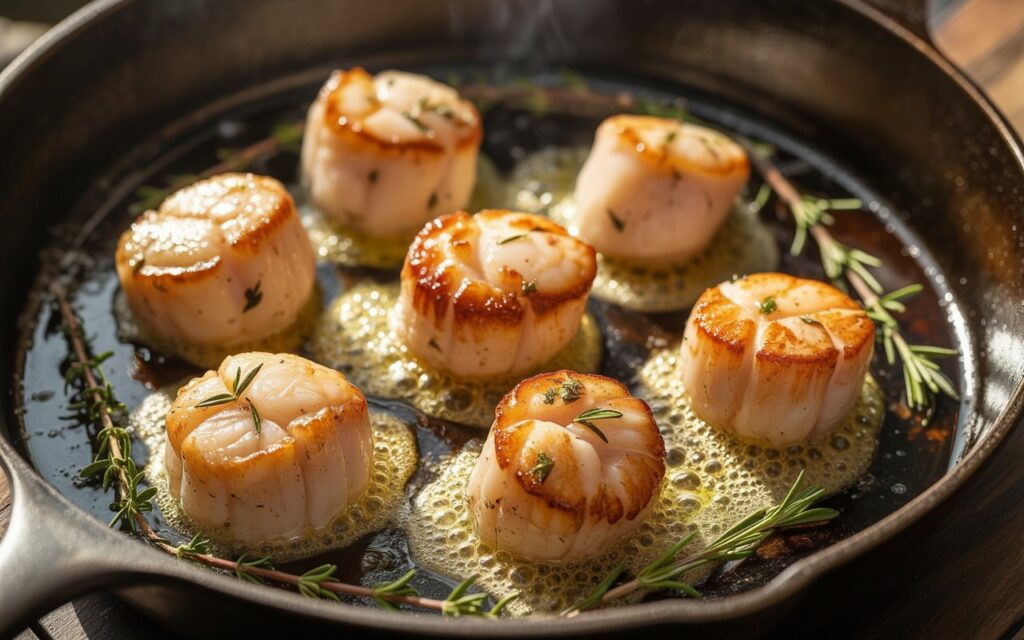
How We Tested This Technique
As someone who focuses on technique-first cooking, I’ve found that the difference between a decent scallop and a great one is all in the details. For this guide, we tested this method with both cast iron and stainless steel pans, using sea scallops from two different suppliers. We confirmed that patting the scallops dry for at least 10 minutes on a paper towel yields a significantly better crust than a quick pat-down.
We also tested searing with and without oil, and found that a high-smoke-point oil is essential for preventing the butter from burning before the scallop is properly cooked. The 1-2 minute sear time per side was determined to be the ideal window for U-10-sized scallops to achieve a perfect crust while remaining tender inside.
Serving and Plating Your Scallop Appetizer
A beautiful presentation makes this simple appetizer feel truly special. A drizzle of the garlic butter pan sauce over the top is a must. For a touch of elegance, serve the scallops over a small smear of warm squash puree or a bed of fresh greens. If you enjoy this method, try it with another excellent seared seafood dish like salmon. A simple garnish of fresh parsley and a lemon wedge is all you need to create a dish that is both delicious and visually captivating.
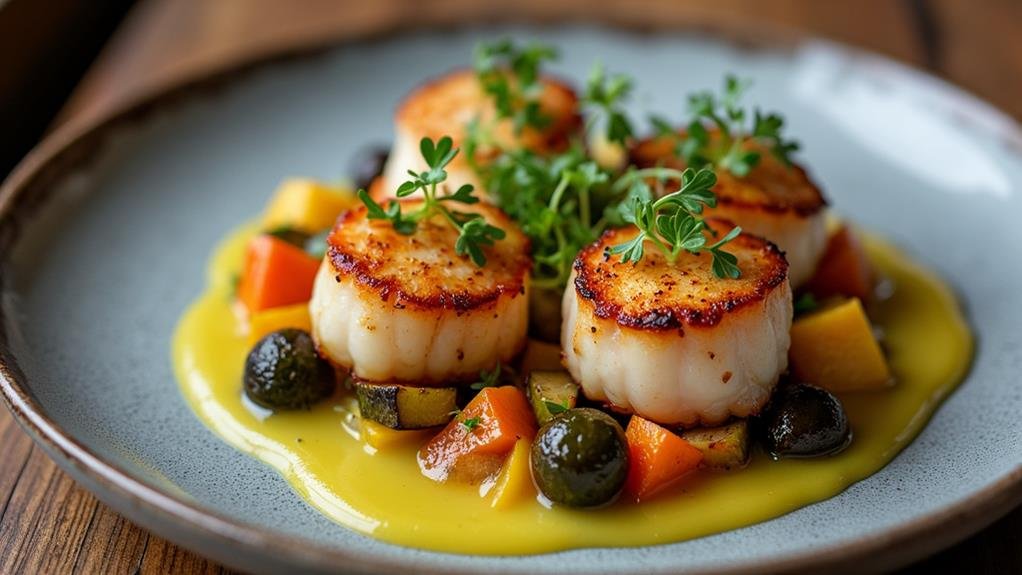
Frequently Asked Questions
What is the best oil for searing scallops?
When searing scallops, choose a high-smoke-point oil, such as canola, avocado, or grapeseed. These oils can withstand the high heat needed for a good sear without burning and creating off-flavors.
How long does it take to pan-sear scallops?
You’ll typically pan-sear large sea scallops for about 1-2 minutes per side over high heat. The exact time depends on their size and thickness. Pay attention to their color; you want a golden crust without overcooking.
Should you rinse scallops before searing?
It’s a good idea to give scallops a quick rinse under cold water to ensure they are free of any sand or grit. After rinsing, it is essential to pat them completely dry. Excess moisture will prevent them from browning.
How do you know when scallops are cooked?
A perfectly cooked scallop will have a golden-brown crust on both sides and will feel firm to the touch, but with a slight spring. The sides should be opaque all the way through. If you cut one in half, the center should be just barely translucent, not raw or rubbery.

John Siracusa is the founder of Hell’s Kitchen Recipes, where he shares his extensive hands-on kitchen-testing experience. As a self-taught culinary expert, John focuses on Gordon Ramsay–inspired cooking, specializing in recipe testing, equipment reviews, and actionable kitchen tips to help home cooks achieve reproducible, restaurant-quality results.
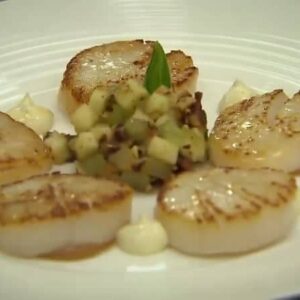
Gordon Ramsay Pan Seared Scallops
Ingredients
- 10 each Scallops, U-10 dry, cut in half
- As Needed Olive Oil
- To Taste (TT) Salt
- 12 oz Apple Butter Puree
- 8 oz Tarragon Mayo
- 4 oz Candied Walnuts
- 8 oz Celery Apple Salad
For Apple Puree
- 8 Apples, finely sliced on a mandolin
- 3 cups Apple Juice
- ½ cup Sugar
- ½ cup Cider Vinegar
- 1 tsp Salt
For Tarragon Mayo
- ½ cup Tarragon, finely chopped
- 1 Tbsp Cider Vinegar
- 8 oz Mayonnaise
- Salt and Pepper To Taste
Candied Walnuts
- ½ cup Sugar
- 1 ½ cups Walnuts
- 1 cup Water
- 1 tsp Salt
- 1 Cinnamon Stick
Instructions
Scallops
- Heat olive oil in a large sauté pan over medium-high heat.
- Season scallops with salt and place them in the pan.
- Cook until blonde on the first side, approximately 2-3 minutes.
- Flip the scallops and cook for 30 seconds on the other side.
- Remove from the pan and place on a plate or sheet tray lined with a paper towel to absorb excess oil.
Apples Puree
- Add all ingredients to a pan with a lid.
- Simmer until apples are very soft, about 20 minutes.
- Remove the lid and reduce the liquid.
- Blend until smooth.
Tarragon Mayo
- Combine all ingredients.
- Season to taste with salt and pepper.
Candied Walnuts
- Bring all ingredients to a boil in a saucepan.
- Allow a syrup to form.
- Strain the walnuts from the liquid.
- Bake at 325°F for 10 minutes on a wire rack.

